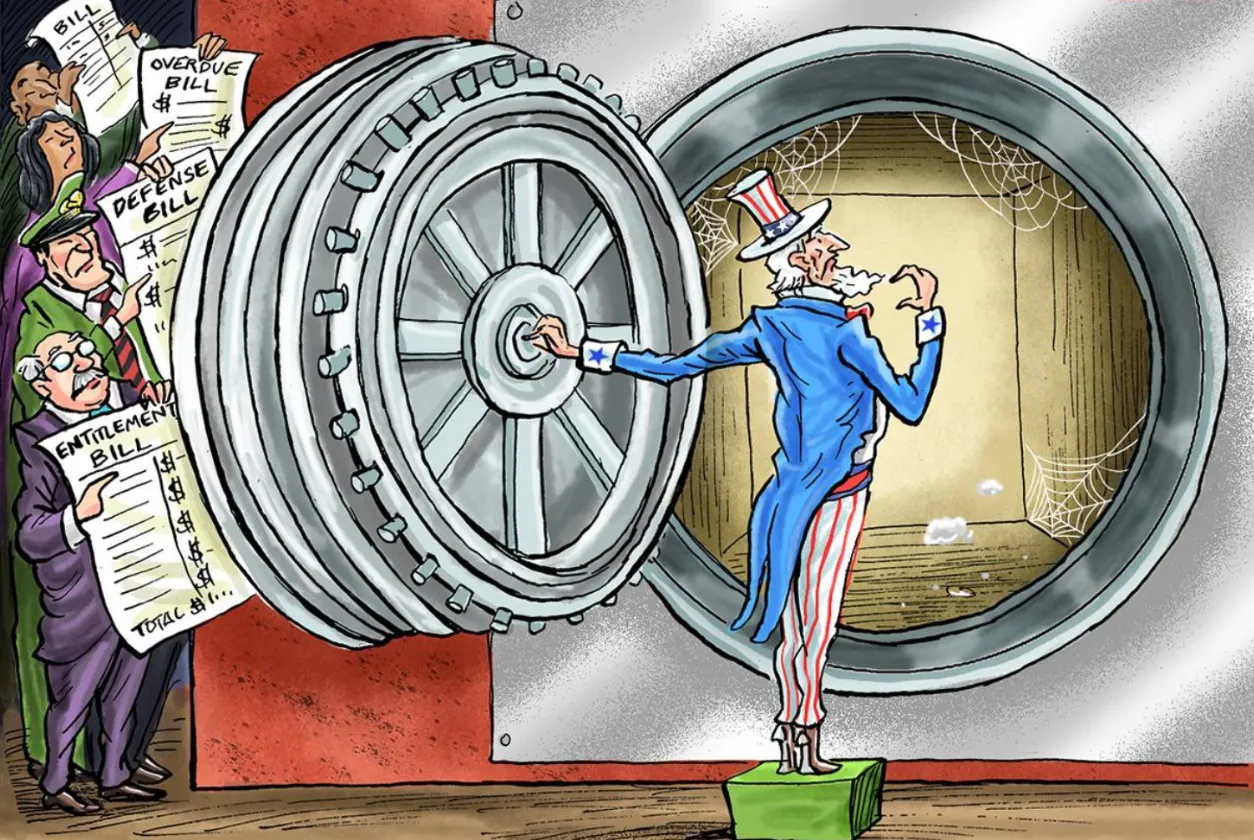Table of Contents
Whether it be the upcoming election or their final exams, members of my generation, Gen-Z, will always find something to complain about. But too often, these day-to-day worries distract us from the far larger problems on the horizon. A crisis is brewing in our country: America’s national debt is now over 33 trillion dollars, and we continue to allow reckless spending that endangers our economic prosperity for generations to come.
This next generation is our generation, and the country’s careless fiscal policies will prevent young people today from living the lives that their parents and grandparents were able to live. When taking a look at the numbers, it becomes clear that the root of our problem is our unhealthy relationship with entitlements. Social Security, Medicare and Medicaid simply cannot be allowed to continue at their projected spending levels. Anything less than a drastic restructuring or reduction of these programs is tantamount to economic suicide.
Let us tackle this issue of entitlements from two different angles.
From an economic perspective, America is in a lot of trouble. The federal government is piling trillions upon trillions onto our national debt, and much of that is due to our reckless entitlement spending. In fact, forty-six percent of all federal spending currently goes to these entitlement programs. Because of this and other unnecessary Biden administration spending, the interest on our national debt will surpass the government’s already massive defense budget by 2025. That means every dollar we borrow from 2025 onward will go toward paying the interest on our previous debt! To fund the government’s functions, therefore, future taxpayers will need to pay far more than they do today.
If we look at Social Security specifically, we can see that it is on a dangerous path. Eventually, the chickens will come home to roost. Retirees, who are living longer, will want their Social Security checks, yet the number of workers who fund their payments is far lower than it was forty years ago.
Our “Population Pyramid” payment structure has failed. It used to be that there were five workers for every one retiree. Now, there are only three-and-a-half workers per retiree. When my generation begins to retire, it will fall to two-and-a-half workers, a change fueled in-part by plummeting fertility rates. This is why, by 2033, Social Security will be insolvent—unable to meet the promised demands for all retirees, necessitating even more congressional spending to meet those demands.
Some may argue that this problem can be solved by raising taxes or adding to the debt (as Modern Monetary Theory would suggest), but both strategies are just fancy ways of seizing trillions of dollars from younger generations either in the short-term or the long-term. That is simply not acceptable. Instead, this looming crisis requires us to reevaluate our Social Security program alongside other welfare programs that are bankrupting the country.
Second, let us address the philosophical and moral aspects of our entitlement system. Put simply, we are entitled to our constitutional rights, and not much more. We are not morally entitled to healthcare or welfare benefits—especially not when their current size jeopardizes the ability of individuals to flourish. These government programs are privileges that, when structured properly, can provide a valuable safety net for Americans. However, sustaining these programs as they are presently constructed is not feasible. Unlike inalienable rights, privileges can and should be adjusted depending on the economic climate.
On a more fundamental level, it is not in America’s DNA to be an entitled people. As President Kennedy famously said, “Ask not what your country can do for you. Ask what you can do for your country.” We are a nation founded on the spirit of industry. For decades, we have led the world in innovation across a myriad of sectors, and that is precisely because of our founding tenets.
Americans are builders. We are scrappy. We are industrious. This is a nation where, if you pull up your sleeves and work hard, you can make a better life for you and your children. This is not a nation in which citizens should expect Uncle Sam to show up and raise their family with welfare checks.
Out-of-control entitlement spending puts the entire American Dream at risk. Specifically, rampant entitlements create problematic incentive structures wherein sometimes people are paid more to stay home then they are to go to work. This is antithetical to the American tradition and cannot be ignored any longer. While special carve outs for disabled veterans or those deemed unable to work are understandable, these welfare programs, when applied to the entire population, are fundamentally un-American and economically disastrous.
The entitlement crisis will not be easy to solve, as even the fiscally conservative Republican Party has failed to address the issue. Both former President Trump and President Biden refuse to touch Social Security due to the perception that entitlements are a political “third rail.” I am glad that in the third GOP primary debate, other candidates finally addressed the dire state of Social Security and Medicare, even if their statements largely rang hollow.
Nevertheless, whether we like it or not, federal entitlements are a problem and they must be reformed. Ignoring the problem does not mean it will cease to exist. It only means that dealing with entitlements will be far more painful down the road. Finding the right policy changes necessary to deal with this problem is a nuanced and complex debate, but for now, acknowledging the crisis is an essential first step.









